|

photo - mw
_______________________
Nail
collected by John Latta
*
A broken mirror nailed up over a chipped enamel basin, whose turgid waters
Reflect the fly-specked calendar—with ecstatic Dutch girl clasping tulips—
On the far wall. Hanging from one nail, an old velvet hat with a tattered bit
of veiling—last remnant of former finery.
The bed well made. The whole place scrupulously clean, but cold and damp.
All this, wedged into a pyramidal ray of light, is my own invention.
—John Ashbery, out of “The Skaters” (Rivers and Mountains, 1966)
*
Is happiness the name for our (involuntary) complicity with chance?
Anything could happen
A boy in the sun drives nails into a fruit a sign (cloud) in the wind swings
A woman descends a ladder into mud it gives way
But today’s thought is different
Better to presuppose late
We eat with relief from our formlessness
Each day is drawn to its scene or scene to its day the image already under way and formed to
proceed
Perhaps happiness is what we volunteer
—Lyn Hejinian, out of Happily (2000)
*
And that thin cry, like a needle piercing the ear, the insistent cicada,
And the ticking of snow around oil drums in the Dakotas,
The thin whine of telephone wires in the wind of a Michigan winter,
The shriek of nails as old shingles are ripped from the top of a roof . . .
—Theodore Roethke, out of “The Rose” (The Far Field, 1964)
*
The self, Hugo said, is the body. Our knowledge of what’s other is a knowledge of our body. My seeing a Monet is a knowledge of my own eye, which is both an obstruction between me and the Monet and the medium by which I see it at all. If my eye is healthy and keen I can forget it. We do not watch our hand, nor yet the hammer, when driving a nail. We watch the nail. Reading, we see Robinson Crusoe with his parrot on his shoulder, yellow sands, green ocean, three goats on a knoll.
—Guy Davenport, out of “Wo es war, soll ich werden” (The Drummer of the Eleventh North Devonshire Fusiliers, 1990)
...(more)
_______________________
Being Gazed Upon
G.L. Mind
Archipelago
(....)
There are many kinds of looks, but a gaze is peculiar. It is a steady look. It is not a dirty look, though it may be “dirty” in some sense. (The man’s gaze made me feel dirty, among other complex sensations, but it was hardly a dirty look.) A gaze is never wild, though it may be mad. A gaze may not actually last long, but it is never a blink, neither hasty nor abrupt. It cannot be confused with a glance or a glimpse. There may be a battle of gazes. The gazer may “avert his gaze” under pressure or threat. I was afraid, and had no way to explore this option in Chicago. A gaze’s steadiness reflects thoughtfulness. It indicates a mind at work (somewhere, unknown and remote) thinking, drawing inferences, contemplating. It is the opposite of a stare. A stare shows dispassion, even an implacable lack of emotional connection. It is the look of an animal contemplating prey, or that of an android. (Tracking and identification data scroll down a head’s-up screen covering its field of vision.) A stare, heartless, without empathy, is the way you might expect a psychopath to consider you before making his kill. Men seem to understand the weight of intimidation that a stare can convey: in many sports, such as boxing, the initial stare-down is a ritual of domination. Even in make-believe, a stare displays an aggressive contempt and indifference: pitiful bug, I am going to destroy you. However brief, a gaze indicates thoughtfulness. The gazer seems to contemplate the person he gazes upon and even to invite connection....(more)
_______________________

photo - mw
_______________________
"Withdraw into protection and safeguard all that is important to you, take it down to below the earth, all that you have, take down the jewelry, the food, the children’s photographs, the armchair where you like to sit with a book in your hand, the curtain, behind which you feel yourselves to be safe, from the window; gather together all that was dear to you, gather together the identity cards and baptismal certificates, take the money out of the bank and hide it in the cellar behind the wall, but really every piece of jewelry, every scrap of food, every photograph of the child, every armchair and every beloved book, every curtain and every document, and really all of the money down to the very last cent, and really hide all of these things well, but really well, under the earth, so that at least you will be able to believe until then that there was some sense to it all, until we get there, seek out protection at least until then, while you are still able to believe that we haven’t got there yet, believe and hope, hope and believe very much that it is rational to prepare for our arrival, just move away and pack up, take the chests stuffed full of pilfered loot, take them one after the other, down below the earth, at least until then do not think about how it is not necessary to wait for us, that it is not necessary to be afraid of us, that we are coming and that there is no need to worry about us, that the day is coming and we are coming, and seeing as it’s already here, seeing as that day has come, and you didn’t notice that it has come, here we are, we see it all, we see what you’re doing with your little chests, we see what you’re doing with your little possessions, and we see what you’re doing with the child, we see everything already from up here, because we are watching you, if you look up you can also see how the light sparkles in our eyes, but you don’t look up, and that is how the day ends for you, and that is how life ends for you, because it is impossible to hide away from us, there is no depth within the earth that could be a refuge for you, we are here, above, here, look we’re watching from up here what you’re doing down there, but we don’t have to watch everything, because we already know everything about you, because the judgment has been brought upon you, and you do not merit the earth, that is what it says in the judgment, because you have gambled away your luck upon the earth, that is what it says in the judgment, because you have become unworthy of the earth belonging to you, all you lot will clear out of here now and someone else is coming, someone else shall live upon the earth, it’s the end of you lot, not even a trace of you all shall remain here, that is what it says in the judgment, so that now you might as well put down that last chest, that too is written in the judgment, and that is why we came here, to execute that judgment upon you."
-
László Krasznahorkai — from Animalinside
reposted from We Await Silent Tristero's Empire
_______________________

photo - mw
_______________________
Library Rules
From William H. Gass's novel Middle C.
presented by Biblioklept
We can’t frisk our customers—I wouldn’t want to put my hands on some—but in the reading room or anywhere—if you see someone taking notes with a pen, you must caution them. Highli—? Indeed. Highlighters—highlighters are evil, they must be immediately confiscated and their users given a talking-to, even if they are marking up their own books or some harmless paper copies. Oh … Marjorie raised her hands to heaven. How I hate highlighters—you don’t use them, do you? Joseph wagged his head. Good, she said, good sign. The dog-ear people do it, stupid students do it, and they will grow dog-ears in due time. You don’t do dogs, do you, Joseph? We never could afford a pet, Joseph said. Good sign. Good sign. Dogs are bad for books. Don’t ever do dogs. They chew. Cats are bad, too. They claw. They love to rub their chins on the corners of covers, leave sneezers of fur. Rub their chins and grin at you. Before they fade from view, Joseph said. Oh, you are a darling, I kiss the nearby air, Marjorie exclaimed.
But it would not be for the last time. The neighboring air got many a smooch. Marjorie’s approval made Joey happy. He was a success.
Do not lean with heavy hands or rest your elbows on a book, even closed, even at apparent peace. You know why, I suppose?
Ah—
...(more)

Snow Melt in the Odenwald
Anselm Kiefer
b. March 8, 1945
_______________________
How Do You Translate Philosophy?
Justin E. H. Smith
(....)
One way to approach the seemingly irresolvable question as to the nature of philosophy is to ask: is philosophy as a human activity more like ballet, or is it more like dance? That is, is it a particular cultural tradition, or is it a universal human activity with many distinct cultural inflections?
(....)
I have suggested that there is something human beings do, qua human beings, that we should be looking for if we want to understand what philosophy is, rather than looking to one, or two, particular civilizational traditions that involve, as is the case in Europe and in India, a highly developed social practice of writing and institutionalized exchange. But what is this something? The full answer lies not so much in etymology or the comparison of names, but in what might be thought of as the anthropology of philosophy: the study of what human capacities are being activated when human beings reflect, infer, compare, classify, coin concepts, distinguish, and deny. My hypothesis is that, if we do this properly, we see that it is not a matter of translation at all. That is to say that there is such an activity, and that human beings engage in it qua human beings, rather than simply in virtue of contact with a particular tradition that extends back to Greece (or perhaps India). ‘Philosophy’ is not a proper noun.
...(more)
_______________________

Siegfried's Difficult Way to Brünnhilde
Anselm Kiefer
_______________________
Idealism & exodus in the thought of Max Stirner
Arran James
attempts at living
... I have to admit, Saint Max, as Marx called him, still floats around as part of the obsessional abyss around which my thought, such as it is, circles and re-circles. Stirner: egoist, proto-existentialist, anarchist, fascist, individualist, idealist, atheist, and, above all, unrelenting nihilist. If there was one thinker that I would have described as an intellectual hero, who I would have demanded everyone read, it would have been Stirner. Today, I rarely mention him- and certainly cringe at being introduced at an academic workshop once as “a Stirnerite”. So it seems like an engagement with this egoist is timely right now; besides which, it’s probably well past time I had some kind of reckoning with a figure that always looms somewhere in my own attempts to grapple with our nihilist age.
(....)
Man, your head is haunted; you have wheels in your head! You imagine great things, and depict to yourself a whole world of gods that has an existence for you, a spirit-realm to which you suppose yourself to be called, an ideal that beckons to you. You have a fixed idea! Do not think that I am jesting or speaking figuratively when I regard those persons who cling to the Higher, and (because the vast majority belongs under this head) almost the whole world of men, as veritable fools, fools in a madhouse. What is it, then, that is called a “fixed idea”? An idea that has subjected the man to itself.
So proclaims Stirner in the mode of iconoclast against idealism. This is hardly tolerant language. The vast majority of humanity, or at least the intellectual classes that Stirner is addressing, and really this audience is comprised of his fellow radicals, stand accused of a kind of madness. This madness consists of being obsessed by a “spirit-realm” of ideas. The implication is clear: Western philosophy, at this time dominated by the Hegelian system of absolute idealism, is little more than a religion followed by fools. In our contemporary language I can’t help but feel that a more faithful translation to Stirner’s vitriolic barbs, if not to the original German, would be closer to “psychotics”. So Stirner looks to philosophy and finds only idealism and in idealism he sees little but a secularised version of religion, and those who commit to an ontology of Gods and spirits can only be the delusional and hallucinatory victims of insanity. Much later in history a professional at diagnosing and theorising phantasms would declare that all metaphysics are hysteria, but Stirner goes further: all metaphysics are psychotic. The irony here is that another of Stirner’s critics would claim that The ego… itself was the ‘conceptual expression of the paranoid schizophrenic’
...(more)
. _______________________
 Avenue du Maine, Paris
1932
Ilse Bing
d. March 10, 1998
_______________________
[Thomas Bernhard:] An Attempt by Ingeborg Bachmann (II)
translated by flowerville
(....)
The fact that a certain person writes at a distance from contemporary literature and increases this distance through solitude... is already a reason for not knowing how to begin to do him justice. Where does he belong, what does he want, where are his points of reference (to what end?), in which conversation, hence in which non-conversation, does this monologue of his participate, what does he have to say and to whom? And what about his society, his readers, his audience, his frontlines, his demands, his value?
If questions about where in the world his modernity, his newness, is to be found lapse into silence, this is doubtless because this newness is not legible from the outside, is not some alphabetic experiment, some calligraphic test of courage, but a radicalness that has its foundation in thought and [carries] it to its utmost extremity. The extent to which these books reflect their time even if they do not intend to will be discovered by a later age, just as only a later age has come to understand Kafka. In these books everything is precise, of the worst sort of precision, but we are as yet ignorant of the thing that is described here so precisely, and therefore of ourselves as well.
...(more)
.....................................................
An excursion via Thomas Bernhard's My Prizes
Steve Mitchelmore
This Space
(....)
After reading Bernhard, one is left with the impossibility of doing justice to the silence behind the game. Clearly this is due to the moderating activity of the critical act and its tendency to orchestrate traditions rather than self-blinding before singularities, but this is also present in the malady of existence, as brought forth by Thomas Bernhard so clearly in his narratives. So, yes, My Prizes is a minor work, a collection dredged from the publisher's bottom drawer and dilute compared to the novels, and, yes, while the anecdotes expose the grotesque vanity and philistine violence of municipal art culture so brilliantly that it is probably enough only to celebrate the comedy, the anger and the excess of My Prizes, none of this would express anything new or worth saying. Every week someone announces to a startled world how funny and dark Bernhard is or how unfunny and dark Bernhard is, and everything they say is true or not true and not worth saying again
(....)
This is the key to Bernhard's radicalism and why he is more than a scourge of bourgeoise pretensions, or whatever else the critics say, and why it's impossible to pin him down. His prose soars, exploding like fireworks illuminating the landscape for a moment before plummeting to earth in darkness. If he knew where he belonged, what he wanted, what he had to say and to what end, in what conversation or non-conversation he might participate, his work would be very different; das gewöhnliche Zeug, to borrow Kafka's uncle's phrase: the usual stuff.
...(more)
_______________________

Three men on steps
Paris, 1931
Ilse Bing - Queen of the Leica
Weimar
_______________________
A Poem of Unrest
John Ashbery
Men duly understand the river of life,
misconstruing it, as it widens and its cities grow
dark and denser, always farther away.
***
And of course that remote denseness suits
us, as lambs and clover might have
if things had been built to order differently.
***
But since I don’t understand myself, only segments
of myself that misunderstand each other, there’s no
reason for you to want to, no way you could
***
even if we both wanted it. Do those towers even exist?
We must look at it that way, along those lines
so the thought can erect itself, like plywood battlements.
_______________________
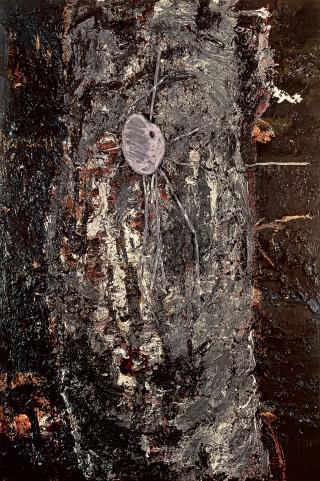
Ygdrasil, Autumn in Auvergne
Anselm Kiefer

The Bridge
1995
Gordon Parks
d. March 7, 2006
_______________________
Spring and All [pdf]
William Carlos Williams
complete
x
The universality of things
draws me toward the candy
wilh melon flowers that open
about the edge of refuse
proclaiming without accent
the quality of the farmer's
shoulders and his daughter's
accidental skin, so sweet
with clover and the small
yellow cinquefoil in the
parched places. It is
this that engages the favorable
distortion of eyeglasses
that see everything and remain
related to mathematics -
in the most practical frame of
brown celluloid made to
represent tortoiseshell -
A letter from the man who
wants to start a new magazine
made of linen
and he owns a typewriter -
July 1, 1922
All this is for eyeglasses
to discover. But
they lie there with the gold
earpieces folded down
tranquilly Titicaca ·- _______________________
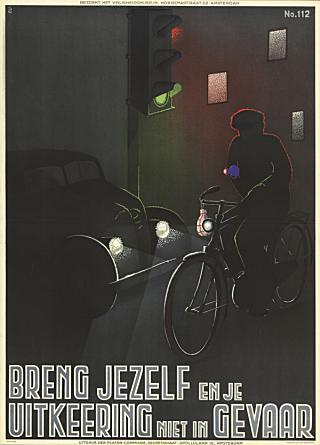
Hoogspanning!:
More Dutch Safety Posters
50 Watts
_______________________
Bonfires in the garden
Lars Huldén
Translated by David Hackston
books from Finland
(....)
Write about what really happens.
Write if you dare.
About things that simply happen,
things that happen all the time.
If you dare.
But to what end?
Poetry, by definition, has fled,
fled from things that
happen all the time.
*
If all goes well,
if I don’t slip in the street,
if I don’t trip on the carpet
or on my own socks,
don’t contract
a rapidly degenerative disease,
can I once again
encounter the spring,
see the anemones raise their eyes,
see the hills, golden with cowslips
casting their bonnets to the wind
to greet the summer
and the future.
But if things don’t go well,
I simply want to amble
invisible along the hillside.
...(more)
_______________________
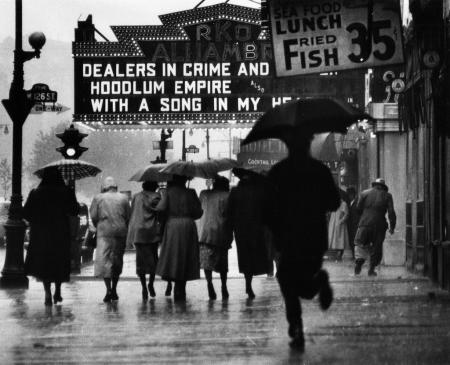
Harlem Neighborhood
Gordon Parks
1952
_______________________
The trouble with "us"
The blurring of social roles and the consensus illusion
Kathrin Passig
Translation by Samuel Willcocks
(....)
The consensus illusion is everywhere, affecting our perceptions about the frequency of certain personal characteristics, or of mental problems, eye colours, tastes in food or films, religious attendance or participation in sporting events. The effect occurs most often when those affected find one another attractive and can reasonably assume that they will stay in touch in future. The effect is even present when respondents know for sure that the majority does not share their opinion; they consistently overestimate the size of the minority to which they belong. False consensus is more prevalent within a group than it is between group members and the outside world.
Shared tastes in consumer culture – or the lack thereof – among groups of friends has become the subject of study in the last fifteen years, as a side-effect of work on marketing algorithms. Nothing in the research findings indicated any significant correlation between certain circles of friends and shared tastes in books, films or music. Nevertheless many people will insist, privately and in public, that they share their friends' tastes in most matters or, at the very least, that they would be able to recommend media to suit their tastes.
As soon as one examines it more closely, consensus among friends proves to be an illusion in other questions of opinion too....(more)
_______________________
The Swarmachine: A Historical Puzzle (Part 1)
Deterritorial Investigations Unit
(....)
If the ‘becoming-revolutionary’ of civil society is marked by emergence, it is the distributed network that forms the aesthetic representation and functional model of this form. Civil society cannot be measured spatially, nor can it be broken down into structural analyses of the institutions that shape social composition. Civil society transcends space, and moves through these institutions; before, but especially after, the rise of information technology we find that civil society is generated through communication: the exchange of words, information, images, signs of all shapes and sizes, allow for a cohesiveness that is both forceful and amorphous. The distributed network eliminates both centralization (where there is a large, fixed center to the network) and decentralization (where there are multiple, smaller network centers) in lieu of a fluid environment where any point is capable – and is compelled – to connect with any other point. There are innumerable examples of the distributed network in action. Alexander Galloway and Eugene Thacker, for instance, have maintained “that in recent decades the processes of globalization have mutated from a system of control housed in a relatively small number of power hubs to a system of control infused into the material fabric of distributed networks.”vi On the flip side, Michael Hardt and Antonio Negri have rendered the distributed network as their model of the “multitude,” the transnational civil society produced by the forces of globalization. In their understanding, the distributed network, particularly in the context of internet-driven information communication technologies, allows for a certain tactical advantage over both the outmoded, decentralized organizations of power leftover from the previous world order, and the new, flexible arrangement of postmodern power. They write:
When a distributed network attacks, it swarms its enemy: innumerable independent forces seem to strike from all directions at a particular point and disappear back into the environment. From an external perspective, the network attack is described as a swarm because it appears formless. Since the network has no center that dictates order, those who can think in terms of traditional models may assume it has no organization whatsoever- they see mere spontaneity and anarchy. The network attack appears as something like a swarm of birds or insects in a horror film, a multitude of mindless assailants, unknown, unseen, and unexpected. If one looks inside a network, however, one can see that it is indeed organized, rational, and creative. It has swarm intelligence. ...(more)
Deterritorial Investigations Unit
Exploring Neoliberal Cartographies
via Synthetic_zero
_______________________
Ukraine, Putin, and the West
n+1
(....)
There’s a reason Ukraine is at the heart of the most significant geopolitical crisis yet to appear in the post-Soviet space. There is no post-Soviet state like it. Unlike the Baltic states, it does not have a recent (interwar) memory of statehood. Nor, unlike almost every other post-Soviet state aside from Belarus, does the majority population have a radically different language and culture to distinguish itself from the Russians. In many cases, for these countries, the traditional language suggests a natural political ally—Finland for the Estonians, Turkey for the Azeris, Romania for the Moldovans. These linguistic and cultural affinities are not without their difficulties, but they do give a long-term geopolitical orientation to these countries.
Ukraine has this to some extent in its western part, formerly known as Galicia, which has strong cultural and to an extent linguistic affinities with Poland. But the country’s capital, Kyiv, has much stronger ties to Russia: Russians consider Kievan Rus, which lasted from the 9th to the 13th century (when it was sacked and burned by the Mongols), to be the first Russian civilization. Russian Orthodoxy was first proclaimed there. Most people in Kyiv speak Russian, rather than Ukrainian, and in any cases the languages are quite close (about as close as Spanish and Portuguese). On television, it is typical for any live broadcast—whether it’s news, sports, or a reality-TV show—to go back and forth seamlessly between Russian and Ukrainian, with the understanding that most people know both. Russians too often assume that these cultural affinities mean that there is no such thing as a separate Ukrainian people. There is. But the closeness of the two peoples makes forging an independent path for Ukraine extraordinarily difficult.
...(more)
_______________________

photo - mw

photo - mw
_______________________
Four Poems
Ian Dreiblatt
for Robert Kelly
jeweléd
“oxen wild like bellowed land”
after most things have happened, Chaon appears.
he’s filth, a mishmash theophage guzzling chaos
out of the city, draining it to linearity. doors become
invisible, alphabets realign their orders under the
meshes of our speech. I will mutely scowl says the sun.
I will turn the Chrysler Building inside out.
he drank so much chaos they called him Chaon,
of course. he took all but two of every household
(as though walls even existed, or remembered light)
and lived in the sky with them. open air pivoting,
invisible embouchure into a body of contradictions.
or into nobody if that’s who we are. I was righteous
out of my age, says Chaon. I soldered together
the seams of the sky, I blew breath into the city’s
gridded syntax. weeks without rain. flesh in no
number. recombinant grammars flash in the
skyline. the doorway. a language all breath
conspires in. bandwidths enlacing to form noise.
...(more)
From Mandelstam Variations
Ian Dreiblatt conjunctions
some things that are like real things it would be good to say or bad not to say
Ian Dreiblatt
from Mandelstam Variations
Harp & Altar
.....................................................
Ian Dreiblatt reviews Alexander Vvedensky's An Invitation for Me to Think
asymptote
(....)
It was a stunning moment—not only in terms of its immediate implications for the heroic women in the defendants' box and their place within Russia's anti-Putin movement, but also for the aesthetic and intellectual lineage that it unearthed and celebrated. The lineage was particularly surprising considering Tolokonnikova's youth and the fact that Vvedensky, who perished in state custody during what Russians call the Great Patriotic War, was not published in his native country until he'd been dead more than fifty years. And even then, he was published only spottily. Tolokonnikova's statement establishes those years of hibernation as a raising of the stakes of Vvedensky's work, a period when his invisibility marked not irrelevance but an increasing and ramifying urgency.
Against this backdrop, there is cause for celebration in NYRB/POETS' recent publication of An Invitation for Me to Think, a collection of most of Vvedensky's surviving writing, edited by the poet and scholar Eugene Ostashevsky. In this volume, Ostashevsky has translated much of Vvedensky's work anew and has also included some of Matvei Yankelevich's previous translations, previously available only in tiny, though gorgeous, editions. Comprising mostly poetry (much of it in the form of several-voice verse plays) and some prose, the book is a beautiful compliment to the public resuscitation Tolokonnikova initiated, a splendid opportunity for English-language readers to become familiar with Vvedensky's vital weirdness and weird vitality, with the English word "weird" applying in its Vvedenskian double meaning of both "strange" and "bound up with fate."
...(more)
_______________________

Russian soliders crossing the Bug River
March 1944
A Look Inside Crimea, Crossroads of Empires
The Daily Beast
_______________________
Advertisements for Death
Susie Linfield
(....)
If the Spanish Civil War was the first conflict to be photographed, by Robert Capa and others, in a modern way — that is, up close on the battlefield and among civilians — the Syrian civil war may be the first truly postmodern conflict, at least when it comes to its images. Both sides are engaged in a perverse competition to show the world, and each other, how ruthlessly barbaric they can be. Aided by new technologies — the cellphone camera, YouTube, Instagram, social-media sites — these images of cruelty ricochet around the globe. The traditional role of war photojournalism has been turned on its head: Rather than expose atrocities, photographs now advertise them.
But in other ways the Syrian images are hardly unique. They are the culmination of a long and ignoble lineage of perpetrator photographs: pitiless pictures taken by tormentors of the violence and sadism they inflict on helpless victims. ...(more)
_______________________
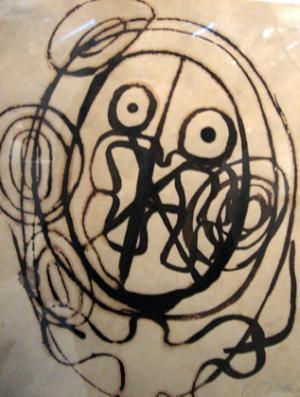
Ejler Bille
Maskers en Cobra-kunstenaars
_______________________
just because you live in a place doesn’t mean you really know where you are
The Poetic Politics Of Space
Rebecca Solnit
(....)
Something that has been important to me since is seeing how the bohemia of the 1950s and ’60s was underwritten by incredibly cheap housing and the ability of many middle-class white people to live off the fat of the land without working very hard—people in the ’60s felt like they could hardly fuck up. I know two people who in the 1970s were wanted fugitives and are now retired professors with pensions, which you couldn’t get now no matter what, let alone as a wanted fugitive with your face on FBI posters. I feel like I also learned, particularly from Wallace Berman, that before you make art you have to have a culture in which to make art—which he understood very deeply. He is recognized for the art he made but he is not so recognized for the culture he made: publishing Semina magazine, participating in the Ferus Gallery and then the little gallery in the Larkspur mudflats, introducing and encouraging people. He wasn’t exactly a mentor, (which sounds avuncular), wasn’t exactly a muse (which always seems like a beautiful young lady, possibly without clothes), but he was a catalyst for people to make culture. Everyone was also making culture by being good audiences for each other and good friends and good community members.
(....)
Rail: It’s very clear that with Savage Dreams you first achieved the hybrid voice you are known for. Were you maintaining writing practices—journalism, criticism, memoir—that were being kept separate before that time?
Solnit: Yes, that is exactly where it happened. I was trained as a journalist so I developed a tough journalistic voice, and I was separately trained as a critic. It’s interesting that postmodernism wanted to undermine, dismantle, and substitute something better than the singular authoritative voice, but that it mostly gave us was manifestos followed quickly by reversions to exactly that voice of objective authority. I thought that speaking personally was one way of addressing that: that there is no such thing as speaking from neutrality in journalism, that the most honest and accountable thing you can do is to establish exactly who is speaking and from what experience. I have a historical mind and have always thought that you understand things by understanding what brought them into being. All of these things came together rather magically after a few years of going to the Nevada nuclear test site, which was this place where tremendous forces converged: the history of the making of the atom bomb, the Cold War, nuclear physics, Western Shoshone activism, white attitudes toward the desert, civil disobedience with anti-war and anti-nuclear movements. It was so complex you couldn’t have told it in a linear, objective way, so I had to find a way to let the threads tangle and weave, that also left room for reverie and digression—which is why I always say the Nevada Test Site taught me how to write. So in Savage Dreams I found a way to bring together my journalistic, critical, and finally lyrical voices (as a way of making wilder leaps of connection) that suddenly all appeared to be the one voice able to describe this complex situation.
...(more)
via (Notes on) Politics, Theory & Photography
_______________________

Ejler Bille
b. March 6, 1910
_______________________
e-flux journal issue 53
Shapes of Freedom: A Conversation with Elizabeth A. Povinelli
(....)
I have gone back and forth between reserving the phrase “late liberalism” for the liberal governance of difference that began to emerge in the late 1960s and early 1970s as liberal governments responded to a series of legitimacy crises coming from anticolonial, anti-imperial, and new social movements, and using the same phrase to refer to the internal and external conditions and dynamics of contemporary European and Anglo-American governance as two of its key pillars, neoliberalism and multiculturalism, emerged in the 1970s and are now undergoing significant stress. My vacillation is symptomatic of the absolute need to distinguish these two modes of governance, to never let either out of the sight of the other. From a political point of view of collective and legitimate action, the neoliberal governance of economies and the multicultural governance of difference were always about the conservation of a specific form of social organization and distribution of life and goods. How can this be when these two forms were new twists in liberal capitalism? How could they be conserving older forms of social organization and be a new form of social organization at the same time?
What interests me is the conservation of differential powers as capitalism was understood as liberation from the market and liberal values were liberated from liberalism. How are these changes conditioned by events inside and outside Europe and the Anglo-American region? How are the consequences of these changes reflected in the forms and affects of liberal governance? What forms of liberal economic and social governance are emerging as the center of economic vitality shifts from the US and Europe to Asia and South America? What is liberalism becoming as nondemocratic forms of capitalism are a central engine of the global economy; nonelected “technocratic” governments are proliferating in Europe; social protest and massive youth unemployment are ubiquitous; secular and religious imaginaries compete on the street; and slums proliferate as the major form of social dwelling in the south and suburbs become ghettos in the north?
...(more)
Reflections on the “Manifesto for an Accelerationist Politics”Antonio Negri Translated by Matteo Pasquinelli
The “Manifesto for an Accelerationist Politics” (MAP) opens with a broad acknowledgment of the dramatic scenario of the current crisis: Cataclysm. The denial of the future. An imminent apocalypse. But don’t be afraid! There is nothing politico-theological here. Anyone attracted by that should not read this manifesto. There are also none of the shibboleths of contemporary discourse, or rather, only one: the collapse of the planet’s climate system. But while this is important, here it is completely subordinated to industrial policies, and approachable only on the basis of a criticism of those. What is at the center of the Manifesto is “the increasing automation in production processes,” including the automation of “intellectual labor,” which would explain the secular crisis of capitalism. Catastrophism? A misinterpretation of Marx’s notion of the tendency of the rate of profit to fall? I wouldn’t say that.
Here, the reality of the crisis is identified as neoliberalism’s aggression against the structure of class relations that was organized in the welfare state of the eighteenth and twentieth centuries; and the cause of the crisis lies in the obstruction of productive capacities by the new forms capitalist command had to assume against the new figures of living labor. In other words, capitalism had to react to and block the political potentiality of post-Fordist labor.
This is followed by a harsh criticism of both right-wing governmental forces, and of a good part of what remains of a Left—the latter often deceived (at best) by the new and impossible hypothesis of a Keynesian resistance, unable to imagine a radical alternative. Under these conditions, the future appears to have been cancelled by the imposition of a complete paralysis of the political imaginary. We cannot come out of this condition spontaneously. Only a systematic class-based approach to the construction of a new economy, along with a new political organization of workers, will make possible the reconstruction of hegemony and will put proletarian hands on a possible future.
There is still space for subversive knowledge!...(more)
#accelerate Manifesto for an Accelerationist Politics Alex Williams and Nick Srnicek _______________________

photo - mw

less than one
Alexander Gonsky
_______________________
Six Likht Variations, with Snakes & Stones (a poem in progress)
Jerome Rothenberg
(....)
3/
atop a mountain
stones
are hammered down
stone after stone
the sun
ignites the air
a carnival
atop a mountain
in a show
with wagging
tongues
stones touching stones
& casting shadows
stones in heaps
the luck of brothers
binding brothers
fire in the sky
a heap of stones
& how a hammer
raised aloft
can signal
joy
...(more)
_______________________
The Year Megaplatforms Ruled The Internet
On the web we lost, the web we deserve, and the web we want.
John Herrman
(....)2013 was a year in which tech’s largest, most visible companies became incumbents — it was the year that the new guard became slightly old. It was not, despite a thousand press releases to the contrary, a year for “disruption” — it was the year that the biggest companies on the internet became bigger, went public, and digested smaller competitors. It was the year that the internet’s mega-platforms became both its center and its central authority. It was a year for “building,” sure, but only on borrowed property.
(....)
It was the year that Facebook turned into Twitter, Twitter turned into Instagram, Instagram turned into Snapchat. It was the year you could rearrange the pairs in the last sentence at random without making it false. It was the year we found out that nearly every major internet service had been compromised in some way by the NSA, and that some were complicit; it was the year these same services refined and fulfilled their financial promises in the form of advertising strategies. It was the year we decided to use these services anyway.
(....)
It’s tempting to predict that 2014 will be the year the megaplatforms begin to falter. It’s extremely tempting to predict that the internet will be remade by teens — those inscrutable, ingenious, or just demographically desirable teens — in their image. Perhaps we widen our view and suggest that 2014 will be the year that casts doubt on America’s continued ability to set international internet trends. Maybe it’s the year a Japanese service takes the international internet by storm, or the habits of Indian users dramatically reshape the web, helping an already huge messaging app from a Chinese company become the most popular service in the world.
Here’s a more realistic prediction: All of these things will happen to some extent, but none will be definitive. 2014 will be the year that the megaplatforms reckon with their age, and that we reconsider our own relationships with them. Their obsessions with one another combined with their users’ creeping unease may create openings for insurgent services and apps, but the megaplatforms’ momentum is strong. New services will catch our attention, but countless old ones will go public, grow, and remain important.
2013 was the year that a major, decade-long internet cycle neared its completion. 2014, at best, will be the very beginning of the next one.
...(more)
_______________________
 Student at Columbia University - 1948
photos by Stanley Kubrick
1 2
_______________________
How the Internet Is Narrowing Our Minds
Linda Besner
hazlitt
(....)
As our options have grown, so has the overwhelming dominance of a generic set of crowd-pleasing blockbusters. Mainstream culture, aided and abetted (or thwarted and warped) by the frenetic pace of the Internet, has fallen into a punishing pattern: a few books—the ones that win prizes, are heavily promoted, or feature at least one vampire—rake in all the media attention and readers. All others are flops. In the book economy, the middle class is dying. The idea of an eHarmony for books is similarly a way of narrowing choices in the face of an overwhelming field of options. Paradoxically, because personalization relies on shared categories, its results can flatten the real differences between individuals.
Why should plenty lead to homogeneity? ...(more)
_______________________
The Mindfulness Racket
The evangelists of unplugging might just have another agenda
Evgeny Morozov
The New Republic
(....)
In our maddeningly complex world, where everything is in flux and defies comprehension, the only reasonable attitude is to renounce any efforts at control and adopt a Zen-like attitude of non-domination. Accept the world as it is-and simply try to find a few moments of peace in it. The reactionary tendency of such an outlook is easy to grasp. As the Slovenian philosopher Slavoj Žižek once quipped, "If Max Weber were alive today, he would definitely write a second, supplementary, volume to his Protestant Ethic, entitled The Taoist Ethic and the Spirit of Global Capitalism." And what a wonderful Kindle Single that would make!
(....)
why we disconnect matters: We can continue in today’s mode of treating disconnection as a way to recharge and regain productivity, or we can view it as a way to sabotage the addiction tactics of the acceleration-distraction complex that is Silicon Valley. The former approach is reactionary but the latter can lead to emancipation, especially if such acts of refusal give rise to genuine social movements that will make problems of time and attention part of their political agendas—and not just the subject of hand-wringing by the Davos-based spirituality brigades. Hopefully, these movements will then articulate alternative practices, institutions, and designs. If it takes an act of unplugging to figure out how to do it, let’s disconnect indeed. But let us not do it for the sake of reconnecting on the very same terms as before. We must be mindful of all this mindfulness.
...(more)
_______________________
Mineful Response, or The Rise of Corporatist Spirituality
Glenn Wallis
Speculative Non-Buddhism
_______________________

Pastoral
Alexander Gronsky
_______________________
from reverses
Víctor Rodríguez Núñez
translated from the Spanish by Katherine M. Hedeen
asymptote
8
[outsides or the groundhog gorges on twilight]
the mountain against an assonant sky
at the point of quartering in its blue fixedness
air crystalizes black coal cedars
and horses scare off the cold
instead of flies
Cartesian geese
advance like syllables
at the edge of the sonnet figurative lake
and break formation
when crossing the snowdrop
of an enjambment blind ditch
everything still to be done
the sign leaking through three branches
essentialized by wind and corrected by snow
they tempt the frogs the only string
night's missing
stuffed with yellow flowers the groundhog
has once more become drive
yesterday weary sycamores fell
and starlings in flight
stir up the shadow charring
the fear that's come back frightened from outside?
...(more)
via The Page
_______________________
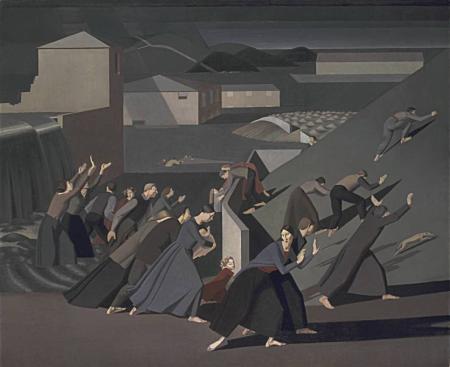
The Deluge
1920
Winifred Knights
(1899-1947)

Vanquished
1930
Emily Carr
d. March 2, 1945
_______________________
Standing Stones
María Auxiliadora Álvarez
Translated from Spanish by Catherine Hammond
everything I want to tell you son Is that you should go through suffering
If you come to its shore if its shore comes to you Enter its night
and let yourself
sink
its gulp may drink you down its foam overwhelm you Let go let yourself go
Everything I want to tell you son On the other side of suffering
Another shore lies
there you will find great stone slabs One of these bears your carved form
etched with your ancient mark Where you in your fullness will
fit exactly
these are not tombs son They are standing stones with their small
engraved suns
and their crevices and cracks
Words without Borders March 2014: Writing from Venezuela
_______________________
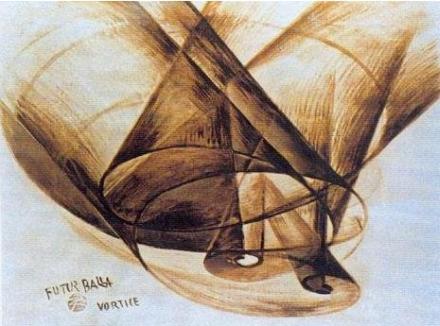
Vortice
1914
Giacomo Balla
d. March 1, 1958
_______________________
Currently at the electronic book review
[a] series of short interventions were made at the “Futures of Electronic Literature” discussion at the bi-annual Electronic Literature Organization conference in 2012. Titled “Electrifying Literature: Affordances and Constraints,” the conference took place at West Virginia University
among the offerings - The Ode to Translation or the Outcry Over the Untranslatable
Natalia Fedorova
ELO: Theory, Practice, and Activism
Claire Donato
dELO: Affordances and Constraints
Samantha Gorman
A Tag, Not a Folder
Ian Hatcher
Literature in a State of Emergency
Davin Heckman
Against Desire: Excess, Disgust and the Sign in Electronic Literature
Brian Kim Stefans
_______________________

Giacomo Balla
_______________________
The Occupied Times 24 [pdf]
Editorial: March 2014
(....)
In mainstream political discourse, words like “insane”, “loony” and “crazy” are frequently used by politicians and media in an effective process of political othering. Those (other than the state) who commit “violence” or anyone from perceived ‘extreme’ poles of left or right can be safely discounted from the ‘grown-up’ arena of the possible, occupied by all who uphold a politics of common sense in which the future is impossible. Who could deny the immanent sanity of liberal democracy? Mental health charities and media campaigners bolster this process of discursive containment with a language of ‘inclusivity’ and empty PR. In doing so, they make the ‘vulnerable’ and ‘marginalised’ into pleading victims, sanitising an anger that should instead be weaponised.
The conditions of late capitalism, left unmentioned and unanalysed throughout mainstream discourse surrounding “the modern epidemic of mental illness”, are practically tailor-made for the mass production of stressed, insecure, isolated and alienated subjects. Whether it’s the systemic centrality of personal debt, the casualisation and precarisation of the labour market or the concerted attacks on those claiming social security, neoliberalism is a factory for the production of misery.
(....)
There is little that connects our lives more than a shared sense of alienation. An alienation of the body and the mind that stems from how we are forced to relate: to work, to space, to nature, to the state and to each other. Popular imagery has the alienated figure of ‘The Madman’ wearing a sandwich board, walking around Oxford Street or Times Square, proclaiming loudly “THE END IS NIGH!”. But given factors such as the round-the-clock climate extremes experienced globally, does this not now seem perfectly rational? Within this situation it is impossible to sustain the pretense that states of mind conform to the grammar of brain chemistry; that any resistance to the order of things is not the sign of competing ideology, but of a pathology.
What is an ordered mind? Perhaps the question is upside down. What would madness be in a world with uprooted power structures, reimagined language and transformed social relations?
...(more)
_______________________
The love of stuff
The problem with our society is not that it values material things too much but that it doesn’t value them enough
Nick Thorpe
aeon
If Western consumer culture sometimes resembles a bulimic binge in which we taste and then spew back things that never quite nourish us, the ascetic, anorexic alternative of rejecting materialism altogether will leave us equally starved. Who, then, can teach me how to celebrate my possessions with the mindful, celebratory spirit of a gourmet?
_______________________

'Mimicry synoptic' or 'Spring'
Giacomo Balla
1915
_______________________
In This World Previous to Ours
Marcella Durand
conjunctions
Divided as half of me is small and distant.
The other tongue talks of exterior objects,
while this one speaks of water and limitation.
Neither understands the other and while looking
for a translator the street ends the clock changes.
Drummers gather, crowd like a meteor, a crush.
Tongue only delivers, does not listen, stone deaf.
All talking makes a crowd plural agitation.
Stand here and see the river an entirely
different way: Under water is air and through
air, passage. Color is another wave that takes
sand, rocks, bridge. Water will reflect everything but
what is inside it. It is like that, trying to
describe it. Like that, I scramble along a shore
catching up to the crowds, people standing there, each
one a stranger, what do I have to say to them?
I want to tell them, but language has divided;
we stand divided, each another point, a line.
...(more)
Marcella Durand
Three poems in Jacket
Five Poems at readme
Four Poems at How2
Four Poems at Lemon Hound
Marcella Durand at PennSound
_______________________
Jacques Roubaud interviewed by Marcella Durand
bomb
(....)
R I write every night. I never correct, I never go back—I just go on and on. Everything I speak about is, in a way, linked to the old abandoned project. I want to say something about it, but I digress as soon as I start saying something, because I remember something else that I then begin to explain, and so on. So the structure is a bit meandering. I begin The Loop with a very old childhood image of snow in Carcassonne, where snow is very rare. I’m in my room and it’s very cold outside. At night there’s frost on the windowpane—I write and make pictures on it. So that’s the image: there’s an outer and an inner space, memory and the present. That’s the first image of the book, which at the end, returns to it.
MD I also thought of this book as extending the invitation in The Great Fire of London that the reader trust that events are true as they unfold in your writing.
JR And if they’re not true (I make mistakes), at least the events are told truthfully, as I remember them.
MD There you talk about renku, an endless sequence of haikus—a perpetual form.
JR The difference between The Loop and the haiku and the renku forms in the The Great Fire of London is that there the writing goes on and on, but it never goes back. In The Loop, my memory changes all the time, but from time to time it also goes back. But when I return to a memory, I do not come back to the same point—the memory has changed.
...(more)
_______________________

Basil Bunting
b. March 1, 1900
Chorus Of Furies
Basil Bunting
Guarda mi disse, le feroce Erine
Let us come upon him first as if in a dream,
anonymous triple presence,
memory made substance and tally of heart’s rot:
then in the waking Now be demonstrable, seem
sole aspect of being’s essence,
coffin to the living touch, self’s Iscariot.
Then he will loath the year’s recurrent long caress
without hope of divorce,
envying idiocy’s apathy or the stress
of definite remorse.
He will lapse into a halflife lest the taut force
of the mind’s eagerness
recall those fiends or new apparitions endorse
his excessive distress.
He will shrink, his manhood leave him, slough selfaware
the last skin of the flayed: despair.
He will nurse his terror carefully, uncertain
even of death’s solace,
impotent to outpace
dispersion of the soul, disruption of the brain.
_______________________

Emily Carr
_______________________
Briggflatts - Part I
Basil Bunting
(....)
Every birth a crime,
every sentence life.
Wiped of mould and mites
would the ball run true?
No hope of going back.
Hounds falter and stray,
shame deflects the pen.
Love murdered neither bleeds nor stifles
but jogs the draftsman’s elbow.
What can he, changed, tell
her, changed, perhaps dead?
Delight dwindles. Blame
stays the same.
Brief words are hard to find,
shapes to carve and discard:
Bloodaxe, king of York,
king of Dublin, king of Orkney.
Take no notice of tears;
letter the stone to stand
over love laid aside lest
insufferable happiness impede
flight to Stainmore,
to trace
lark, mallet,
becks, flocks
and axe knocks.
Dung will not soil the slowworm’s
mosaic. Breathless lark
drops to nest in sodden trash;
Rawthey truculent, dingy.
Drudge at the mallet, the may is down,
fog on fells. Guilty of spring
and spring’s ending
amputated years ache after
the bull is beef, love a convenience.
It is easier to die than to remember.
Name and date
split in soft slate
a few months obliterate.
...(more)
Basil Bunting at PennSound
|



























